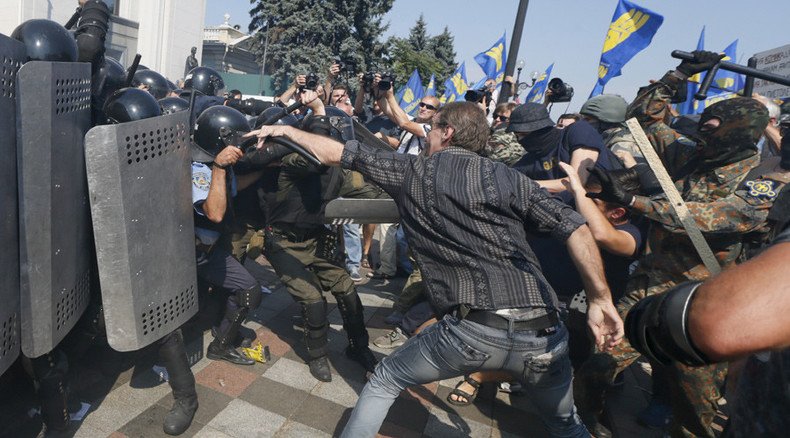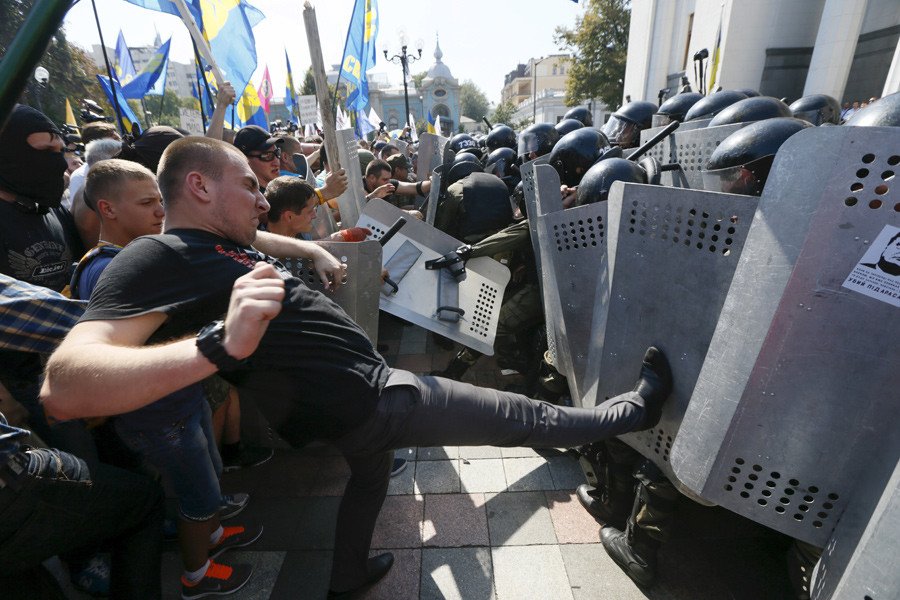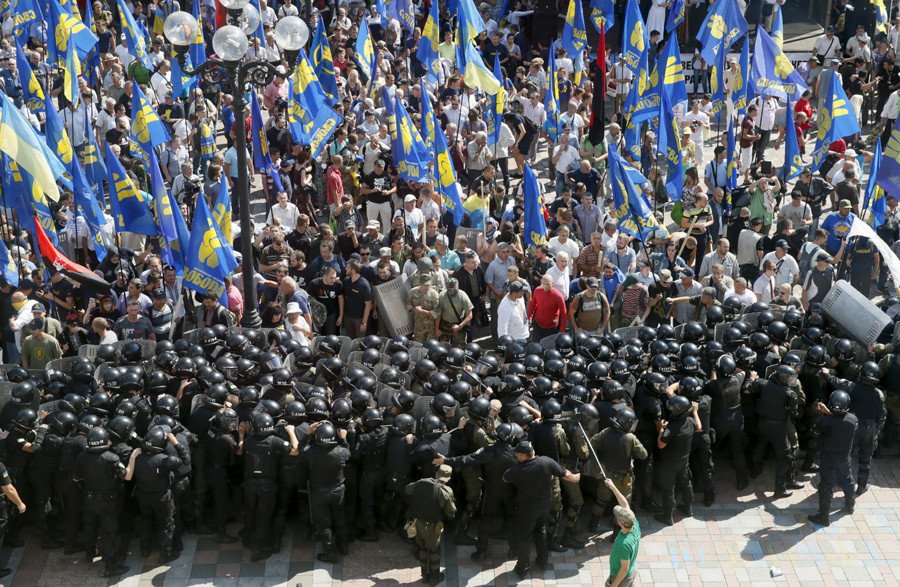‘Victoria Nuland may be passing out virtual cookies outside Kiev’

The same forces that are pushing radicals in key hot spots in and around Europe – the US in the first place – also have a part in the protests going on in Kiev. They are not innocent, they just don’t appear in the picture in front of the TV cameras, says political analyst Aleksandar Pavic.
In Kiev, Ukraine’s capital, crowds of protesters came to oppose amendments to the constitution that would provide for decentralization of the country. As a result dozens were injured and one security officer was killed after a grenade was thrown outside the parliament.
READ MORE: Multiple injuries in Kiev as grenade explodes during protest against constitutional law
RT: Do you think we could expect further escalation in Kiev?
Aleksandar Pavic: Ukraine is basically becoming a failed state, it already is. This is a state that has been practically permanently destabilized ever since the Maidan in February 2014. You’ve actually had the radical agenda that’s become institutionalized, meaning that any voices that are calling for any sort of compromise - let’s say with Russia - are being marginalized, being demonized and have just been pushed out of the political spectrum. As a result, radicals are feeding each other and what we have today is practically the revolution coming back to devour some of its children.
The most radical elements were practically the key actors in Maidan and they pretty much set the tone in Ukraine nowadays. So that’s the internal part of the story. But I think externally we also have to think about who gains from this, not just the internal actors. This is a key moment meaning this is something that’s supposed to advance the Minsk agreement agenda. And who would benefit from that being, let’s say, sabotaged? I think maybe it’s the country that’s not part of the Minsk process and I’m clearly talking about the US. And I wouldn’t be surprised. Victoria Nuland isn’t down there passing cookies today, but she may be passing virtual cookies from somewhere else. This is part of a general agenda just keeping Ukraine a kind of unstable place, a failed state on the border of Russia.
RT: How real is the threat posed by far-right groups that have been opposing the government?
AP: It still is because you have the Right Sector, it’s the same actor pretty much who was the key, the most radical actor of Maidan almost a year and a half ago and they’ve become a major factor in Ukraine. They are the ones who are forcing the agenda. Whoever tries to do anything moderate, whoever tries to pursue any sort of compromise, you have the so-called radicals, Right Sector, etc. who are there to halt the process. The same forces that are just pushing radicals in key hot spots in and around Europe – I’m again talking about the US in the first place – they also have a part in this. They are not innocent; they just don’t appear in the picture in front of the TV cameras.

RT: President Poroshenko's approval ratings are plummeting. What in the eyes of the Ukrainian people is going wrong?
AP: Poroshenko first of all is not being viewed, for one, as a genuine leader. It’s clear that without Western support he wouldn’t even be where he is. The other thing is a total catastrophe that’s taking place in Ukraine today; its economy is practically dead. Corruption is probably greater than it ever was even during the corruption that preceded Maidan. It’s clear that Ukraine has become ruled by oligarchs and of course Maidan was being organized in the name of so-called democracy. What is the average Ukrainian supposed to be satisfied about? There are no good results that have come from this past year and a half regarding the life of the average person: You’ve seen prices go up, social instability, uncertainty as far as employment is concerned. No prospects of recovery anytime soon. Why should they be happy with Poroshenko?
LISTEN MORE:
West committed to Ukrainian govt ‘obviously going down’
Alexander Mercouris, International Affairs Editor at Russia Insider, suggests that it was predictable that protests would take place in Ukraine as radical groups there are not happy with the peace plan, with the way Kiev is implementing it, with the economic situation and political issues with the government
RT: Are you surprised that the decentralization amendments triggered such a violent response?
Alexander Mercouris: No, I’m not surprised at all. If you have been looking at the situation in Ukraine for some time, there has been increasing protests against the government by various right-wing groups - Right Sector is the most famous. Going back several weeks they are not happy with this whole peace plan, they are not happy even with the limited way the Ukrainian government is implementing it, they are not happy with the economic situation and they’ve got their own political issues with the government. So it was entirely predictable that they would protest today and given the kind of people they are it was entirely predictable these protests would be violent.
RT: How far are these protesters prepared to go?
AM: I think the protesters themselves are prepared to go very far indeed. I think some of them would probably want to see the government changed. The question is do they have the strength to achieve that and I think the answer is no.

RT: If there is a standoff here between these protesters and the government, Poroshenko in particular, who is going to come out on top here and how long this process is going to take?
AM: The danger is that neither is going to come out on top. I think what we are seeing in Ukraine is a stalemate situation. The government was talking some time ago about suppressing these people and it’s never got around to doing it, and it doesn’t seem to have the strength to do it. And these people in turn don’t seem to have the strength to overthrow the government. So we have a perpetual standoff with two sides, each antagonistic.
RT: What kind of reaction to this violence should we expect from Kiev's allies in Europe? Are we going to see some condemnation?
AM: No, I don’t think there is going to be any at all. In fact, I think the media and Western governments are going to try to ignore this incident, however violent it is. Privately they will be very concerned, because of course if the situation escalates, or if whatever steps have been taken in Kiev towards decentralization proposals are derailed, then they will be left with a very difficult situation having committed themselves to a process and to a government that is obviously going down. But until that point is reached they will try and pretend it isn’t happening.
RT: An explosion has gone off near the parliament building. Who might have weapons able to cause that? These are not protesters, aren’t they?
AM: No, they are not protesters. The Right Sector and various other right-wing groups are better understood as armed right-wing militias. They’ve been involved in a military operation in the country’s east and some of them have had various military weapons that they have been supplied by the Ukrainian government and by various Ukrainian businessmen and politicians. So they are very heavily armed and very dangerous.
The statements, views and opinions expressed in this column are solely those of the author and do not necessarily represent those of RT.
LISTEN MORE:
The statements, views and opinions expressed in this column are solely those of the author and do not necessarily represent those of RT.












